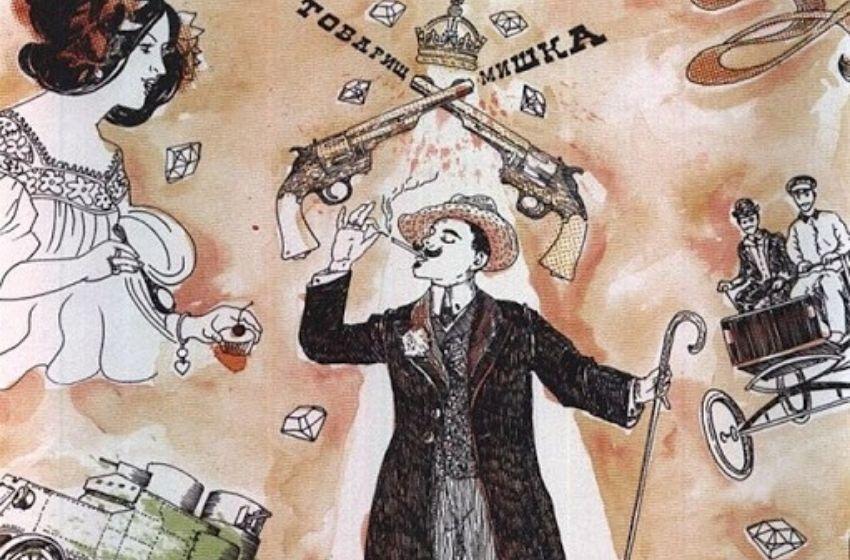The legend of the Odessa gangster Mishka Yaponchik, the Robin Hood of Moldavanka, continues to live thanks to Isaac Babel, who used the famous deeds of Yaponchik to create the character of Benny Krik in his "Odessa stories". Thanks also to Mikhail Vodyaniy, who played the character of Benny Krik/Yaponchik in a film. And thanks to Leonid Utyosov, a famous Soviet singer, who colourfully recalls Yaponchik in his memoirs.
Mikhail Volfovich Vinnitsky was born on the 30th of October 1891, in Odessa, in the Moldavanka district. His father, Meer-Wolff, was a respected bindyuzhnik (a cargo carrier on a large bindyug cart) in Hospital Street and was known in the city as a binder with a very tough disposition, especially when he was drunk. His father died early and Mishka worked in a mattress workshop, and then as an electrician at the Anatra aviation plant.
But, like his father, he was attracted by the world of gallant gentlemen and beautiful ladies, the world of money, which he observed in the rich aristocratic center of Odessa. Mishka had a daring decisive character, a reputation as a fighter, and he had ambitious ideas for his future.
He was called "Yaponchik", which means “the Japaneseâ€, for his black hair, high-cheeked face and slanting eyes.
In 1905, during the Jewish pogroms, Mishka participated in self-defense units, organised by the Jewish community, and received a weapon that he kept for himself. Soon, with a detachment of fearless anarchists, Yaponchik began to carry out raids on shops and rich apartments. And send letters to Odessa merchants demanding to hand over funds "for the needs of the revolution", certified by a seal with a skull and bones.

On August the 30th, 1907, fifteen-year-old Mishka Vinnitsky took part in a raid on a flour shop of the merchant Lanzberg, in Baltic road. Then, another raid on Lander's apartment took place on the 28th of October. On December the 6th of the same year, Mishka was arrested by accident, during a raid, in a brothel in Bulgarian street. The verdict of the Odessa Military District Court was twelve years. According to another version, Yaponchik received a sentence for the impudent murder of a police chief at the corner of Dalnitskaya and Stepovaya.
While in prison, Yaponchik found a village youngster, who received a short sentence, and took him under his protection. And he charmed him so much that they agreed to change not only surnames, but also criminal charges. So after few years Mishka was at large. The scam was soon discovered. But the criminal police, not wanting to put the shame on themselves in front of the higher authorities, decided not to reveal this mistake. And, in order to cover up the traces. Yaponchik’s photos were removed from the criminal case, which will help the gangster more than once in his criminal career.
King of Thieves of Moldovanka
Mishka was 24 years old when he decided that the time had come to conquer the underworld of Odessa. One autumn day, Mishka visited the one-eyed red-bearded Meyer Gersh, local leader of the thieves of Moldavanka, to apply for joining the "house". He quickly gained authority among the Odessa raiders and started putting together his own gang of daring Moldovan thugs. Gradually, the entire criminal world of Odessa recognized him as their leader. After only two years Yaponchik ascended the throne of leader of all Moldovan raiders and smugglers, which meant some thousand people. And the one-eyed Meyer Gersh became Mishka's right-hand man and a consultant on the tactics of uniting all thieves' groups into one huge gang.

Yaponchik's people penetrated everywhere. They terrified the Odessa cattle traders, shopkeepers, middle-class merchants, and they meekly paid Mishka a generous tribute. Yaponchik introduced his people to the police and recommended which ranks and how much "to put in his bosom". Odessa police were at the mercy. This had never happened before in the Russian Empire.
Yaponchik also held the primacy in the Country in organising a criminal syndicate, which included gangs from other provinces. He adjusted the flow of funds to his treasury from various regions of Russia. In the "organisationâ€, there was a strict division into criminal professions. There were gunners, hired killers, traders, swindlers, and so on. The job paid well. Odessa's society talked about the stunning raids on restaurants, theatres and places where the commercial elite gathered. At a certain moment, being not robbed by Yaponchik became simply not respectable for a merchant. Something like a downgrade.
The popularity of Mishka Yaponchik in Odessa was so great that legends were told about him during his lifetime. A stocky dandy with slanting eyes in a bright cream suit and a yellow straw boater hat, with a bow tie and a bunch of lilies in his buttonhole walked along Deribasovskaya, accompanied by two bodyguards from among his most inveterate raiders. The policemen bowed respectfully. He had also a chair at the Opera House in the front row, where he used to go with his beautiful wife.
Every day Yaponchik went to the Fanconi cafe, where he had his own table. Located in the centre of the city, in the midst of commercial life, the café was turned into his “headquarter†for stock brokers to be aware of all the transactions. There the gangster felt himself equal among equals.

But the King of Thieves introduced also the “raider's codeâ€, a violation of which was punishable not only by expulsion from the “houseâ€, but also by death. When he was young, he had heard a story from a Portuguese sailor about the Japanese mafia Yakuza in Nagasaki, which members of the criminal organisation had agreed on common rules and never broke them. According to this “code,†doctors, lawyers, and artists were given the privilege of living and working in peace. Robbing and insulting them was considered the strictest violation of the “lawâ€.
Yaponchik longed for the recognition of the intelligentsia. He liked to attend literary and musical evenings. However, most of the cultural class of Odessa shunned him. Therefore, he came up with a cynical move in his own style. Yaponchik robbed every famous musician or artist who was on tour in the city, and as a result the unfortunate man had to turn to Mishka with a request to return his things. He showed his regret, shaking his head and clicking his tongue for a long time. Then, he ended up apologizing for the poor education of his boys and took the artist to his wardrobe and offered to take everything that he could carry. The victim's belongings were returned and a toast to friendship was made. They say that even the Opera singer Feodor Chaliapin was caught in the nets skilfully placed by Mishka.
On Moldavanka, Yaponchik often organised noisy feasts. Smuggled food, olives, fried and stuffed fish, oranges, vegetables and vodka served in buckets were displayed on the tables. The tables were full of free food. In gratitude, the Moldavian women of the district named Mishka Yaponchik the King.
Among the underworld, Yaponchik was a friend of a well-known Bessarabian robber, Grigory Kotovsky, a frequent visitor to gambling dens and clubs, who was expert in the art of disguise, wearing uniforms of a gendarme officer or of a poor army captain with equal zeal. When Kotovsky was in prison, awaiting sentencing, Mishka organised a plan for a spectacular escape. During the Russian Civil War, Kotovsky, became a red brigade commander and he repaid Mishka with betrayal at the most difficult time for the bandit.
The Russian Civil War
The King of thieves gained an enormous power during the Civil War. At the height of hostilities the gang under the leadership of Yaponchik turned out to number, according to various sources, from two to ten thousand armed thugs. They knew the city very well and had even many strongpoints on the outskirts.
From 1917 to 1920, more than a dozen authorities changed in Odessa. Each one established its own order. Mishka Yaponchik's resourcefulness saved the gang from disaster more than once. He very subtly sensed the mood of the authorities and, thanks to this attitude, he always saved his “house†in the nick of time.
In December 1918, socialists and anarchists decided to storm the city prison, and Yaponchik's bandits also took part, to free their fellows together with the other political prisoners. Mishka himself led the assault, armed with a revolver and, oddly, a lemon in his hand. The freed bandits in prison clothes stopped a tram and stripped the passengers to change their clothes.

Such manoeuvrability made the city authorities decide to arrest Yaponchik and put an end to a troublesome competitor in the city. But, only Denikin's general Schilling, commander of the Odessa military district, succeeded. He dispatched several counterintelligence officers to Café Fanconi. They were sitting at a nearby table, drinking Turkish coffee. When Yaponchik's bodyguards left, the armed officers pulled out their revolvers, intending to eliminate the King. Mishka leaned against the wall and tried to negotiate with the officers, in order not to be shot in the back,. Onlookers began to gather, which was what Yaponchik wanted. White officers did not want to shoot in a crowded place and decided to take Mishka to their headquarter to receive further orders.
The rumours about the arrest of Yaponchik spread throughout Odessa and reached Moldavanka. Thirty minutes later armed raiders ran to the counterintelligence building. They blocked the street with phaetons. Several people approached the frightened sentries and, in a polite Odessa manner, asked to urgently hand over Mishka. Schilling resisted for a long time. But fear took over. The King went out on the threshold and bowed politely to the petrified sentries.
Yaponchik tried to reconcile with the Whites and even sent a letter to the military governor Grishin-Almazov, to no avail. Then, he declared war to the “gold chasersâ€: he entered into skirmishes with them, unleashing real street battles.
Denikin’s officers and city authorities, were outraged by the impudence of the King of Odessa raiders. Newspapers in every way branded Yaponchik with shame. Every shop window, every police station, restaurant, casino and hotel, featured a profile and full-face photograph of him. But they no longer dared to arrest him.
In early April 1919, the Reds came back to Odessa. Representatives of the Revolutionary Sailors' Committee came to Yaponchik to ask him to organise the security during a concert to collect funds for the orphans of those who died for the revolution. Posters of famous artists were posted around the city with the postscript: “Order is guaranteed. There will be no robberies in the city until 2 amâ€. And below the signature: "Moisey Vinnitsky, a.k.a. Mishka Yaponchik." Odessans could walk around the city at night without fear. Yaponchik's people were patrolling, ensuring their security.
Several days passed. And, like every government in Odessa, the Bolsheviks began to establish their own order, in which there was no place for Yaponchik and his gang. Raids were carried out. Slobodka and Moldavanka were particularly affected. Yaponchik took the new government's activity calmly. But when the Bolsheviks began to shoot his people without trial or investigation, Mishka disappeared from the city for several weeks to analyse the new situation and he realised, to his great disappointment, that Russia would be Bolshevik. Therefore, in order to save his army of thousands of thieves, he had two options: either to fight the Bolsheviks, or to surrender to the new order. But, Yaponchik made an unexpected move in his own style.
On May 31, 1919, he published a letter on the newspaper Izvestia of the Odessa Council of Workers' Deputies, telling how he served 12 years for revolutionary activities, visited the front, participated in the dispersal of counter gangs and even commandeered an armoured train. In early June, the head of the Special Department of the Cheka of the 3rd Ukrainian Army, Fomin, was informed that Mishka Yaponchik was waiting for him in his office. He was so frightened that he ordered immediately a squad to seize the weapon from Yaponchik. To their big surprise Mishka did not have neither a pistol, nor a pocket knife. And bigger surprise was te see the enthusiastic attitude of the Chekists to Yaponchik, because they had heard the stories about his daring feats.
I would like my guys under my command to join the ranks of the Red Army. I have weapons, money too. I only need your permission to form a squad.
Mishka Yaponchik
Fomin contacted immediately the commander of the army, Nikolai Khudyakov. After a short meeting in the Revolutionary Military Council, it was decided to give the go-ahead for the formation of the regiment. After that Mishka Yaponchik immediately began military and political training of his regiment, which received the name of "54th Soviet Regiment".
It was the strangest unit of the Red Army. Yaponchik was the commander, the chief of staff was Meyer Seider, nicknamed Majorchik, a former owner of a brothel. The picturesque Red Army bandits marched across Odessa with two Jewish orchestras, in front of their commander Mishka on horseback. Odessa residents were proud of their bandits. Many cried and waved their handkerchiefs.

In early June 1919, persistent rumours spread about the advance of the big army of General Denikin. Mishka sent the command of the 3rd Ukrainian Army a proposal to form a separate regiment from his guys and strike the enemy on his own territory. The red army command was surprised that the bandit understood military strategy better than them, but nevertheless decided to send the 54th Soviet regiment (2,400 people) to fight the nationalist army of Petljura.
On July 23, Yaponchik's regiment arrived in Birzulu (Kotovsk until 2016; today, Podolsk). The regiment became part of the 2nd brigade of G.I. Kotovsky, the old acquaintance of Mishka. The battle against Petljura lasted for several hours. Yaponchik's regiment not only withstood the attack of its own lines, but, to everyone's surprise, went on the attack. Yaponchik completed the task with minimal losses and won. The enemy retreated. Oddly enough, the victory of Yaponchik was not appreciated by Kotovsky, who feared his influence on the soldiers. Moreover, Yaponchik knew about Kotovsky’s pre-revolutionary affairs, when he was a Bessarabian robber.
Also other red leaders were also jealous. Therefore, all the brigade commanders, staff officers and political commissars of the division gathered for a secret meeting, at which they unanimously decided: to disarm the regiment and eliminate his commander. Yaponchik expected a similar outcome, but counted on Kotovsky's help. Unfortunately, this one supported the conspiracy against his former friend, fearing for his personal career as a red brigade commander.
Yaponchik was too skilled not to understand the plot to arrest him and destroy his unit. He instructed a part of the regiment to return by roundabout ways to Odessa. He himself with one hundred and sixteen fighters went for supplies. The plan was simple and brilliant. At the Pomoshnaya station, Yaponchik with his men captured a train and forced the drivers to go to Odessa.
But the commissar of the 54th regiment, Feldman, betrayed his commander. On August 4, at dawn, in Voznesensk, the Yaponchik's train was waited by a detachment of red cavalrymen. Yaponchik was declared under arrest, while his fighters were locked in carriages, isolated from their commander. He politely asked to repeat the order. He was told for the second time and demanded to surrender his weapon. Yaponchik grinned, turned his back to the cavalrymen and in front of them began to move away towards the forest belt. The battalion commander Ursulov, stunned by such impudence, fired. Mishka turned around and took out a revolver, exposed the general's saber and went to the gunman. Shots rang out. When the smoke cleared, Yaponchik was lying on the ground, mortally wounded.
The 116 soldiers of Mishka's detachment were arrested and sent under escort to a place to be executed. Six years later in the village of Chabanka, near Odessa, the glorious red commander Kotovsky was shot dead by Meyer Seider, the former chief of staff of Yaponchik. It was revenge for the betrayal of the King.

Small in stature, stocky, quick movements, slanting eyes - this is Mishka-Yaponchik." Yaponchik "- for his slanting eyes - is his bandit, thief-like" pseudonym. "His real name is Vinnitsky. and made him the king of the criminal world on an Odessa scale. Brave, enterprising, he managed to get his hands on the whole Odessa thugs. In American conditions, he would undoubtedly have made a great career and could have stepped on even Al Capone's corn.
Leonid Utyosov, Soviet singer
The King of the Odessa’s organised crime before the Red Revolution remains the hero of novels and films, countless anecdotes, songs of Odessa folklore and even three operettas.



















